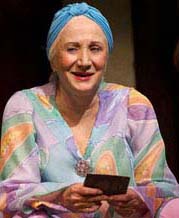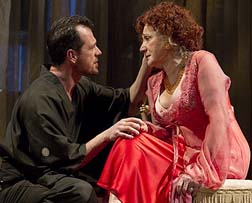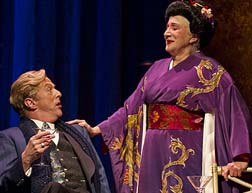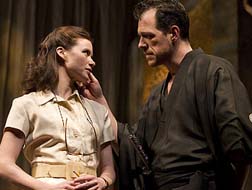By Lucy Komisar
There’s a touch of the Southern Gothic in many of Tennessee Williams’ plays, and it is usually seasoning in a pungent stew about human relationships, desires, and failings. But The Milk Train Doesn’t Stop Here Anymore is overwhelmed by Southern Gothic till it becomes a potboiler, a parody of a melodrama. Director Michel Wilson’s over-the-top staging seems to tell us it’s camp and not to take it seriously.

This production is saved by the extraordinary performance of Olympia Dukakis, whose portrayal of the garish, bullying, self-centered Flora Goforth takes fire and pulls you in till you feel part of the conflagration.
Flora, whom Williams burdens with a Dickensian name, was a showgirl whose first husband made her a millionaire. She proceeded to marry three others, but loved only the last, a young poet, who, driving the red sports car she gave him, crashed and died on the Corniche from Monte Carlo.
Now in her sixties, still with her American southern accent, she lives near Naples in a villa atop a cliff on the Amalfi coast overlooking the sea. It’s 1962. She is dictating her memoirs, mostly about her lovers and social life among the international set, to Frances Black, Blackie, (Maggie Lacey) a rather prim and conventional young woman (from a good women’s college) whose husband recently died.

Into that often bizarre scene comes a strange man, Christopher Flanders (Darren Pettie), 39, who makes mobiles and supports himself by attaching himself to rich elderly ladies. (The kindness of strangers?)
Given their ages and conditions, the women all die, which has given him the name angel of death. Yes, this play is unsubtly about death.
Chris has climbed up a goat path and breached a fence to trespass on the grounds. She directs him to a cottage, and you wonder what each has in store for the other.
Flora spends a lot of time in a nightdress lolling on a round bed under a skylight, frequently buzzing to summon Blackie to take notes. She is a woman who expects people to jump to her orders. She refuses to face up to her own mortality, though she takes morphine for her neuralgia. She in fact is a paean to life, glorying in her past.
There are frequent sounds of sea gulls and a lot of turgid prose.

She is visited by a gay friend (Edward Hibbert), known as the Witch of Capri, a fey blonde fellow who seems overdressed for the island. Hibbert simpers too much. However, he fits into the weird mood. Though I could not figure out why he could not pronounce Capri (accent on the first syllable), while Flora could. The full costumed kabuki dance she puts on for him is a show stopper.
She is challenged by Chris. Attempting to maintain control, she refuses to let him eat. She declares, I give away nothing, I sell and I buy. In fact, they both want to use each other. He will wait her out.

Pettie as Chris and Lacey as Blackie do their best to bring their characters to life, though they seem uncomfortable in the setting, which gets more surreal as the play goes on.
This play was finished in 1963, the year Williams’ long-time lover died. It is almost a satire of the writer’s best works of the 40s and 50s, and has only historical interest.
The Milk Train Doesn’t Stop Here Anymore. Written by Tennessee Williams; directed by Michael Wilson. Roundabout Theatre Company at Laura Pels Theatre, 111 West 46th Street, New York, NY. (212) 719-1300, http://www.roundabouttheatre.org/offbroadway/themilktraindoesntstophereanymore/. Opened January 30, 2011; closes April 10, 2011. Olympia Dukakis‘ understudy Gordana Rashovich plays the role of “Flora Goforth” on Wednesday evenings through March 30th. Also on New York Theatre Wire.

